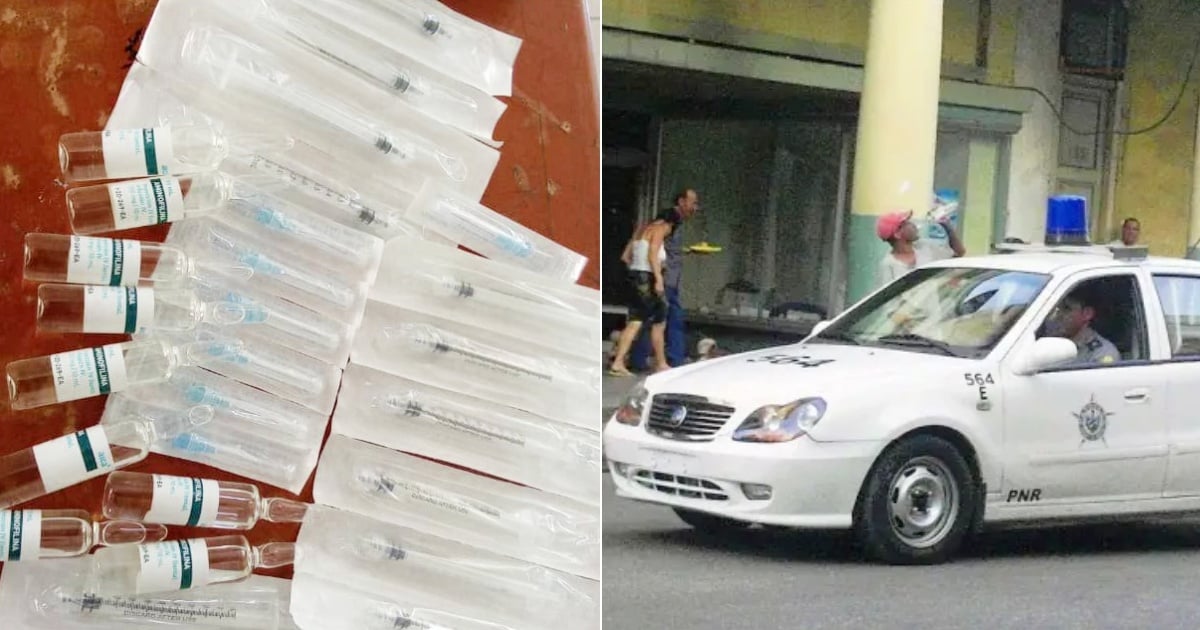
Related videos:
A joint operation between the Ministry of the Interior (MININT) and the Security and Protection Corps of the Arnaldo Milián Castro Hospital in Santa Clara, Villa Clara, culminated in the arrest of an assistant from the geriatrics unit of this hospital.
The individual, whose name has not been revealed for "legal reasons," was caught in possession of illegally obtained medications and medical supplies intended for sale.
The detainee was captured while attempting to sell aminophylline ampoules for 500 Cuban pesos (CUP) each and syringes for 150 CUP in areas near the hospital, commonly referred to as the "New Hospital" of Santa Clara.
The arrest was made by the security agents of the institution themselves, who thwarted the illegal operation before it could materialize, according to the official communicator Henry Omar Pérez on Facebook.
"This act constitutes a serious ethical and legal violation, representing a ruthless appropriation of vital resources intended for healthcare, especially for the most vulnerable elderly population. The lack of ethics and the evident greed of the detainee directly affect the health of those who rely on these medications for their well-being," the source pointed out.
The investigation is now focused on determining the scale of the drug theft and establishing criminal accountability.
For its part, the management of the Arnaldo Milián Castro Hospital has begun an administrative analysis process to assess potential failures in internal controls. Meanwhile, the question arises of how many elderly patients could have benefited from those essential medications that were illegally taken.
Recently, the case of Kleisy Suárez came to light, a licensed Physical Therapist, father of two girls and a Jehovah's Witness, who was arrested for having an arsenal of medications that he was informally selling in Manzanillo, in the Granma province.
In this case, the arrest took place at the seller's home, where the police seized a significant quantity of pharmaceuticals and medical supplies, some imported and others domestically produced.
The products -in a context of serious drug shortages in the country- were promoted through social media and later sold for home delivery.
Initially, Suárez only had medications sent by his family from the United States. However, over time, he also began to offer locally produced drugs, the origin of which is currently being investigated.
Among the products he sold were antibiotics, antiparasitics, analgesics, anti-inflammatories, antihistamines, medications for blood pressure and heart conditions, eye drops, ointments, syringes, and suture materials.
Shortage of medications, a national tragedy
The shortage of medications in Cuba has become one of the most serious crises facing the population, affecting both individuals with chronic illnesses and those in need of urgent treatments.
The lack of basic supplies in pharmacies and hospitals has forced many Cubans to rely on donations from abroad, the black market, or exchanges among neighbors to obtain essential medications such as antibiotics, analgesics, and drugs for cardiovascular diseases or diabetes.
This health crisis, exacerbated by a lack of raw materials and the inefficiency of the state production and distribution system, has led to treatable diseases becoming more complicated and an increase in cases of preventable deaths.
The Cuban government has acknowledged the scarcity but attributes the crisis to external factors, while specialists and citizens point to poor management, corruption, lack of investment, and the centralization of the pharmaceutical sector as the fundamental causes of the shortages.
At the same time, prices in the informal market have skyrocketed, leaving the most vulnerable sectors in a critical situation.
The desperation to access medications has driven many families to turn to support networks abroad or to solidarity campaigns organized by the diaspora, reflecting the profound crisis of a healthcare system that, in theory, guarantees free services, but in practice cannot provide even the most basic necessities to its citizens.
Frequently asked questions about the illegal sale of medications and the healthcare crisis in Cuba
What happened to the healthcare professional detained in Villa Clara?
A geriatric assistant at the Arnaldo Milián Castro Hospital was arrested for illegally selling medications and medical supplies. The arrest occurred following a joint operation between the Ministry of the Interior and the Security Corps of the hospital, highlighting the issue of resource diversion in the Cuban healthcare sector.
How does the scarcity of medications affect the Cuban population?
The scarcity of medications in Cuba has become a serious crisis affecting both chronic patients and those in urgent need of treatment. The lack of basic supplies in pharmacies and hospitals forces many Cubans to rely on the black market, donations from abroad, or exchanges among neighbors to obtain essential medicines.
What measures is the Cuban government taking to combat the illegal sale of medications?
The Cuban government has intensified operations to detect and sanction the illegal sale of medications. However, these measures do not address the underlying causes of the shortage, such as mismanagement, corruption, and the centralization of the pharmaceutical sector, which limits their effectiveness.
What impact does corruption have on the Cuban healthcare system?
Corruption within the Cuban healthcare system directly impacts the quality of medical care and access to medications. This exacerbates the health crisis in the country, making it difficult to treat diseases and increasing the number of preventable deaths, while the most vulnerable sectors are the most affected.
Filed under: